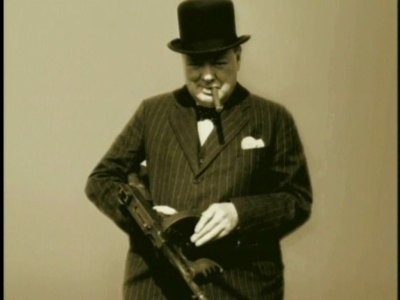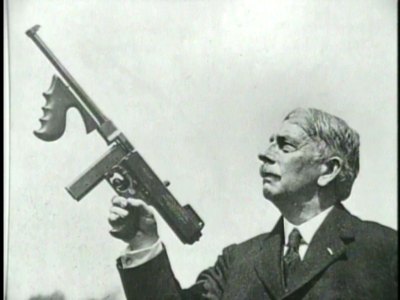| Reviews & Columns |
|
Reviews DVD TV on DVD Blu-ray 4K UHD International DVDs In Theaters Reviews by Studio Video Games Features Collector Series DVDs Easter Egg Database Interviews DVD Talk Radio Feature Articles Columns Anime Talk DVD Savant Horror DVDs The M.O.D. Squad Art House HD Talk Silent DVD
|
DVD Talk Forum |
|
|
| Resources |
|
DVD Price Search Customer Service #'s RCE Info Links |
|
Columns
|
|
|
History of the Machine Gun, The

The History of the Machine Gun starts off well, with its approach of discussing the machine gun in terms of how it had dramatically altered the nature of armed conflict - as well as the resulting political landscape - a good framework for examining the weapon itself. All of the early highlights of the weapon's development are here, including Gatling's first prototypes and later refinements, as well as Hiram Maxim fully automated, gas-powered breakthrough in 1884.
But as this early chapter of The History of the Machine Gun unfolds (it's broken into three, one-hour segments: White Smoking Devil, The Gun Comes Home, and The Age of the A.K.), it becomes clear that The History of the Machine Gun has other things on its mind besides examining the machine gun. A long discussion of colonial expansion is undertaken (with the effects of the machine gun in those conflicts overplayed, as they often are), which segues into a look at the slaughter of WWI, where much is made of the colonial powers getting a "taste of their own medicine" when it comes to the horrific effects of the machine gun (with America's ruthless efficiency through Ford's assembly line getting equal blame for the mass production of weapons). The effects of aerial machine guns are briefly mentioned, but no specifics are drawn other than looking at the synchronization problems associated with the propeller-driven planes.
After the war, the Thompson "Tommy gun" machine gun in America is discussed. Rockefeller's use of it during the Ludlow massacre in 1914 is mentioned in passing. The film disingenuously suggests that the murder victims were killed by a machine gun; in actuality, the women and children died from suffocation from a fire. We then move on to a look at Prohibition, gangsters, consumers purchasing the Tommy, and labor unrest in America put down by the Tommy (although there are no figures given as to how many striking laborers were actually killed by the Tommy gun). Again, a cursory look is given to the Tommy itself, but the emphasis of The History of the Machine Gun is clearly on attacking Western - specifically American - society and its politics. When discussing the Prohibition era, gangsters are described in terms of misfits rebelling against an uncaring society (instead of as criminal psychotics who murdered innocent people), while the average American who purchased a gun is seen as the unwitting dupe of a marketing campaign to sell war surplus.
When it comes time to look at WWII, there's a brief discussion of the cheaply produced, crude German MP-38 and MG-42 machine guns. The main point of this section appears to be emphasizing the dangers of such a cheaply produced machine gun falling into the hands of the regular solider, setting up the remainder of the documentary as a warning call for the proliferation of the machine guns. Which of course is odd, because the following segments glorify the development and use of the Russian AK-47 as the "people's weapon," an easily-reproduced and repairable weapon that "freedom fighters" all over the world have used to challenge the corrupt West. Kalashnikov, the inventor of the AK-47, is lionized (while American inventors Gatling and Thompson were given much less deferential treatment), with The History of the Machine Gun slipping into genuine delusion during the Vietnam era when the Vietcong are heralded as "freedom fighters." A former Vietcong fighter is profiled, where she describes the barbarism of American troops - but leaves out some of the more colorful Vietcong practices - before detailing her exploits as a prostitute (what any of this has to do with the history of the machine gun is unclear).
The Russians and Afghanistans are looked at next (with America again slammed for supplying arms to the rebels), while the final section on urban American violence seeks to bizarrely blame the police for developing SWAT teams and arming themselves on a scale equal to gang members; evidently, according to The History of the Machine Gun, cops defending themselves contributes to the public feeling that there is no more law and order.
The History of the Machine Gun alternates archival footage with "talking heads" interviews, ranging from politicians like John Bolton and Alan Clark (former U.K. Defense Minister), to historians like Professor Carroll Pursell and Professor Eric Hobsbaun, to director John Milius and certifiable loony, Noam Chomsky. The History of the Machine Gun is utterly predictable in its construction, alternating these two sources of information on a regular and predictable basis, linked by an unenthusiastic narration. All in all, it's a rather desultory affair, particularly at the protracted three hour length.

The DVD:
The Video:
The full screen transfer for The History of the Machine Gun isn't the greatest, with a grainy, soft image and compression issues.
The Audio:
The Dolby Digital English 2.0 stereo mix is more than enough for the dialogue-heavy The History of the Machine Gun.
The Extras:
There are no extras for The History of the Machine Gun.
Final Thoughts:
Hey, if your tastes run towards Marxist-Leninist social and economic theories about greedy capitalist Western countries battling innocent "nationalistic" freedom fighters, then The History of the Machine Gun should be right up your socialist collective commune's alley. Enjoy that rental (or better yet; borrow it from the local library and stick it to those evil capitalist DVD corporations). But if you're looking for a straight documentary on the invention, production and implementation of the machine gun - as the title of The History of the Machine Gun surely suggests - you would do well to look elsewhere. Skip The History of the Machine Gun.
Paul Mavis is an internationally published film and television historian, a member of the Online Film Critics Society, and the author of The Espionage Filmography.


|
| Popular Reviews |
| Sponsored Links |
|
|
| Sponsored Links |
|
|
| Release List | Reviews | Shop | Newsletter | Forum | DVD Giveaways | Blu-Ray | Advertise |
|
Copyright 2024 DVDTalk.com All Rights Reserved. Legal Info, Privacy Policy, Terms of Use,
Manage Preferences,
Your Privacy Choices | |||||||














